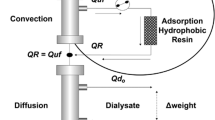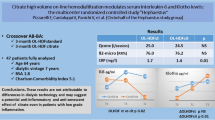Abstract
Effects of online hemodiafiltration (HDF) using acetate-free bicarbonate dialysis (AFD) fluid on microinflammation, resulting in improved nutritional status in hemodialysis patients, were examined and compared with conventional acetate-containing bicarbonate dialysis (ACD) fluid. A total of 24 hemodialysis patients were registered for a cross-over design study for a 6-month period. These patients were subjected to ACD for the first 3 months followed by AFD fluid for the latter 3 months. Blood variables of C-reactive protein (CRP), interleukin-6 (IL-6), leptin, neuropeptide Y (NPY), protein catabolic rate (PCR) and %creatinine (Cr) index were determined after the first and last 3-month period. The filters and the conditions of HDF and drug regimens including erythropoiesis-stimulating agents were unchanged throughout the cross-over study. Predialysis blood pH and bicarbonate were significantly higher in the AFD phase than in the ACD phase. Blood CRP and IL-6 levels were significantly decreased in the AFD group compared to the ACD group. Concerning nutritional evaluation, leptin and NPY were significantly lower and higher, respectively, in the AFD phase than in the ACD phase. PCR tended to be higher in the AFD phase than in the ACD phase. A significantly higher %Cr index level was observed in the AFD phase than in the ACD phase. These results suggest that online HDF using AFD fluid contributes to alleviating bioincompatible events associated with microinflammation, leading to improvement in the nutritional status in hemodialysis patients.
Similar content being viewed by others
References
Stenvinkel P, Heimbürger O, Paultre F, Diczfalusy U, Wang T, Berglund L, Jogestrand T. Strong association between malnutrition, inflammation, and atherosclerosis in chronic renal failure. Kidney Int. 1999;55:1899–911.
Owen WF, Lowrie EG. C-reactive protein as an outcome predictor for maintenance hemodialysis patients. Kidney Int. 1998;54:627–36.
Zimmermann J, Herrlinger S, Pruy A, Metzger T, Wanner C. Inflammation enhances cardiovascular risk and mortality in hemodialysis patients. Kidney Int. 1999;55:648–58.
Rashid G, Benchetrit S, Fishman D, Bernheim J. Effect of advanced glycation end-products on gene expression and synthesis of TNF-alpha and endothelial nitric oxide synthase by endothelial cells. Kidney Int. 2004;66:1099–106.
Kültz D. Hyperosmolality triggers oxidative damage in kidney cells. Proc Natl Acad Sci USA. 2004;101:9177–8.
Gerardi G, Usberti M, Martini G, Albertini A, Sugherini L, Pompella A, Di LD. Plasma total antioxidant capacity in hemodialyzed patients and its relationships to other biomarkers of oxidative stress and lipid peroxidation. Clin Chem Lab Med. 2002;40:104–10.
Kawabata K, Nakai S, Miwa M, Sugiura T, Otsuka Y, Shinzato T, Hiki N, Tomimatsu I, Ushida Y, Hosono F, Maeda K. CD31 expression on leukocytes is downregulated in vivo during hemodialysis. Nephron. 2001;89:153–60.
Kawabata K, Nagake Y, Shikata K, Fukuda S, Nakazono H, Takahashi M, Ichikawa H, Makino H. Soluble P-selectin is released from activated platelets in vivo during hemodialysis. Nephron. 1998;78:148–55.
Filiopoulos V, Vlassopoulos D. Inflammatory syndrome in chronic kidney disease: pathogenesis and influence on outcomes. Inflamm Allergy Drug Targets. 2009;8:369–82.
Aucella F, Vigilante M, Gesuete A, Maruccio G, Specchio A, Gesualdo L. Uraemic itching: do polymethylmethacrylate dialysis membranes play a role? Nephrol Dial Transplant. 2007;22:v8–12.
Bossola M, Sanguinetti M, Scribano D, Zuppi C, Giungi S, Luciani G, Torelli R, Posteraro B, Fadda G, Tazza L. Circulating bacterial-derived DNA fragments and markers of inflammation in chronic hemodialysis patients. Clin J Am Soc Nephrol. 2009;4:379–85.
Mion CM, Hegstrom RM, Boen ST, Scribner BH. Substitution of sodium acetate for sodium bicarbonate in the bath fluid for hemodialysis. Trans Am Soc Artif Intern Organs. 1964;10:110–5.
Graefe U, Follette WC, Vizzo JE, Goodisman LD, Scribner BH. Reduction in dialysis-induced morbidity and vascular instability with the use of bicarbonate in dialysate. Proc Clin Dial Transplant Forum. 1976;6:203–9.
Grandi, E, Govoni, M, Furini, S, Severi S, Giordano E, Santoro A, Cavalcanti S. Induction of NO synthase 2 in ventricular cardiomyocytes incubated with a conventional bicarbonate dialysis bath. Nephrol Dial Transplant. 2008;23:2192–7.
Amore A, Cirina P, Mitola S, Peruzzi L, Bonaudo R, Gianoglio B, Coppo R. Acetate intolerance is mediated by enhanced synthesis of nitric oxide by endothelial cells. J Am Soc Nephrol. 1997;8:1431–6.
Higuchi T, Yamamoto C, Kuno T, Okada K, Soma M, Fukuda N, Nagura Y, Takahashi S, Matsumoto K. A comparison of bicarbonate hemodialysis, hemodiafiltration, and acetate-free biofiltration on cytokine production. Ther Apher Dial. 2004;8:460–7.
Todeschini M, Macconi D, Fernández NG, Ghilardi M, Anabaya A, Binda E, Morigi M, Cattaneo D, Perticucci E, Remuzzi G, Noris M. Effect of acetate-free biofiltration and bicarbonate hemodialysis on neutrophil activation. Am J Kidney Dis. 2002;40:783–93.
http://www.kidney.org/professionals/kdoqi/guidelines_updates/doqiuphd_appx.html
Hara M. Calculation of protein catabolic rate using pre- and postdialysis blood urea nitrogen concentration. J JSDT. 2000;33:347–52.
http://www.kidney.org/professionals/kdoqi/guidelines_updates/nut_appx02a.html
Cockcroft DW, Gault MH. Prediction of creatinine clearance from serum creatinine. Nephron 1976;16:31–41.
National Kidney Foundation. K/DOQI clinical practice guidelines for nutrition in chronic renal failure. Am J Kidney Dis. 2000;35:S1–140.
Weinhold B, Bader A, Poli V, Rüther U. Interleukin-6 is necessary, but not sufficient, for induction of the human C-reactive protein gene in vivo. Biochem J. 1997;325:617–21.
Stenvinkel P, Lindholm B. C-reactive protein in end-stage renal disease: are there reasons to measure it? Blood Purif. 2005;23:72–8.
Campfield LA, Smith FJ, Guisez Y, Devos R, Burn P. Recombinant mouse OB protein: evidence for a peripheral signal linking adiposity and central neural networks. Science. 1995;269:546–9.
Lee CT, Lee CH, Su Y, Chuang YC, Tsai TL, Cheni JB. The relationship between inflammatory markers, leptin and adiponectin in chronic hemodialysis patients. Int J Artif Organs. 2004;27:835–41.
Lam MF, Leung JC, Lo WK, Tam S, Chong MC, Lui SL, Tse KC, Chan TM, Lai KN. Hyperleptinaemia and chronic inflammation after peritonitis predicts poor nutritional status and mortality in patients on peritoneal dialysis. Nephrol Dial Transplant. 2007;22:1445–50.
Don BR, Rosales LM, Levine NW, Mitch W, Kaysen GA. Leptin is a negative acute phase protein in chronic hemodialysis patients. Kidney Int. 2001;59:1114–20.
Kokot F, Chudek J, Adamczak M, Wieçek A. Interrelationship between plasma leptin concentration and severity of metabolic acidosis in haemodialysed patients with chronical renal failure. Exp Clin Endocrinol Diabetes. 2001;109:370–3.
Zheng F, Qiu X, Yin S, Li Y. Changes in serum leptin levels in chronic renal failure patients with metabolic acidosis. J Ren Nutr. 2001;11:207–11.
Aguilera A, Codoceo R, Bajo MA, Iglesias P, Diéz JJ, Barril G, Cigarrán S, Alvarez V, Celadilla O, Fernández-Perpén A, Montero A, Selgas R. Eating behavior disorders in uremia: a question of balance in appetite regulation. Semin Dial. 2004;17:44–52.
Hegbrant J, Mårtensson L, Thysell H, Ekman R, Boberg U. Changes in plasma levels of vasoactive substances during routine acetate and bicarbonate hemodialysis. Clin Nephrol. 1994;41:106–12.
Juarez-Congelosi M, Orellana P, Goldstein SL. Normalized protein catabolic rate versus serum albumin as a nutrition status marker in pediatric patients receiving hemodialysis. J Ren Nutr. 2007;17:269–74.
Tomo T, Matsuyama M, Nakata T, Kadota J, Toma S, Koga N, Fukui H, Arizono K, Takamiya T, Matsuyama K, Ueyama S, Shiohira Y, Uezu Y, Higa A. Effect of high fiber density ratio polysulfone dialyzer on protein removal. Blood Purif. 2008;26:347–53.
Desmeules S, Lévesque R, Jaussent I, Leray-Moragues H, Chalabi L, Canaud B. Creatinine index and lean body mass are excellent predictors of long-term survival in haemodiafiltration patients. Nephrol Dial Transplant. 2004;19:1182–9.
Kaizu Y, Kimura M, Yoneyama T, Miyaji K, Hibi I, Kumagai H. Interleukin-6 may mediate malnutrition in chronic hemodialysis patients. Am J Kidney Dis. 1998;31:93–100.
Goodman MH. Interleukin-6 induces skeletal muscle protein breakdown in rats. Proc Soc Exp Biol Med. 1994;205:182–5.
Haddad F, Zaldivar F, Cooper DM, Adams GR. IL-6-induced skeletal muscle atrophy. J Appl Physiol. 2005;98:911–7.
Mitch WE. Mechanisms causing loss of lean body mass in uremia. Adv Nephrol. 1997;26:133–42.
Lofberg E, Gutierrez A, Anderstam B, Wernerman J, Bergstrom J, Price SR, Mitsh WE, Alvestrand A. Effect of bicarbonate on muscle protein in patients receiving hemodialysis. Am J Kidney Dis. 2006;48:419–29.
de Brito-Ashurst I, Varagunam M, Raftery MJ, Yaqoob MM. Bicarbonate supplementation slows progression of CKD and improves nutritional status. J Am Soc Nephrol. 2009;20:2075–84.
Conflict of interest
None declared.
Author information
Authors and Affiliations
Corresponding author
Rights and permissions
About this article
Cite this article
Matsuyama, K., Tomo, T. & Kadota, Ji. Acetate-free blood purification can impact improved nutritional status in hemodialysis patients. J Artif Organs 14, 112–119 (2011). https://doi.org/10.1007/s10047-010-0551-7
Received:
Accepted:
Published:
Issue Date:
DOI: https://doi.org/10.1007/s10047-010-0551-7




